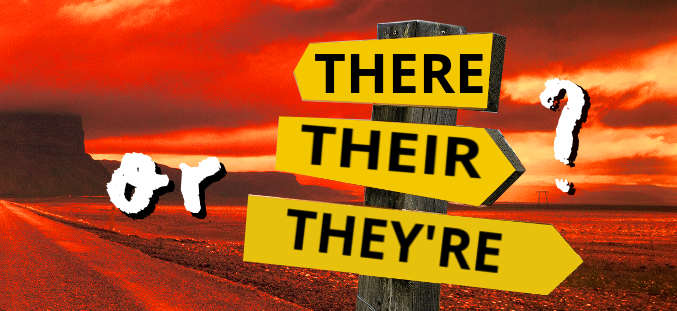 Tricky points
of English ...
Tricky points
of English ...
Correct
use of their, there
and they're
in English
Is it their, there or they're ?
Choosing between there, their and they're is not really a question of grammar; it is a matter of choosing the right word. It is similar to the choice you could face when deciding which word to use to describe a particular piece of fruit called une pomme in French, ein Apfel in German or una manzana in Spanish. Do you choose the word pear, apple or banana ? Only one of them is correct.The problem with there, their and they're is that they all sound the same;
they are all pronounced [ðeə]
But apart from their similar pronunciation, these three words are quite different.
- There is normally either an adverb or expletive pronoun, i.e. a subject pronoun that refers to a following object or complement.
- Their is a possessive adjective
- They're is a contracted form of they are, so the pronoun they plus the verb are.
Perhaps the most confusing expression for learners of English is the expression there are, which often sounds like "there're" [ðeərə] or even just like "theere" [ðeə ] in spoken English.
► They're / They are or there are?
There are does not mean the same as they are or they're, and cannot be used instead of them; the same is true with other tenses, of course, there were, there will be, etc.- We use there is or there are etc. to refer to a noun or noun phrase that follows.
- We use they are to refer back to a noun or noun group that has already been mentioned (an antecedent)..
Examples:
There
As an expletive pronoun
I like London
because there
are red buses.
There was a strange smell in this room
There are fifteen people in a rugby team.
(We would not say: They are fifteen people in a rugby team.)
How many people are there in a football team ?
There was a strange smell in this room
There are fifteen people in a rugby team.
(We would not say: They are fifteen people in a rugby team.)
How many people are there in a football team ?
As an adverb of place
I don't know
London, I've never been there.
Would you like to sit there, please.
Would you like to sit there, please.
Their
As a possessive adjective
Most parents
look after their
children.
As my car was in the garage, we went in their car.
As my car was in the garage, we went in their car.
They're
Contraction of they are
I
like documentary films, because they're often
interesting.
(or... I like documentary films, because they are often interesting.
but never... I like documentary films, because there are often interesting )
I can see the first runners; they're coming into the arena now.
Don't eat those berries; they're very poisonous.
(or... I like documentary films, because they are often interesting.
but never... I like documentary films, because there are often interesting )
I can see the first runners; they're coming into the arena now.
Don't eat those berries; they're very poisonous.
Comparisons
An example to remember, as it uses all three different examples of phonetic [ðeə]
They're
building
a new garage right there
in front of their
house.
They are or there are ? Compare and contrast these examples:
I
like detective films, because there
are often exciting endings.
I like detective films, because they are often exciting
There will be no buses on Christmas day.
As for bus services, they will not be running on Christmas day.
But note also...
As for bus services, there will not be any on Christmas day.
There is
required to
refer to a following
complement, exciting
endings or no
buses on Christmas dayI like detective films, because they are often exciting
There will be no buses on Christmas day.
As for bus services, they will not be running on Christmas day.
But note also...
As for bus services, there will not be any on Christmas day.
They is necessary in order to refer to an antecedent - detective films or bus services.
In the final example, there is required, as it does not refer to the antecedent bus services, but to the following pronoun any.
Return to Linguapress home page Check out more problem words in English



 Copyright
information.
Copyright
information.